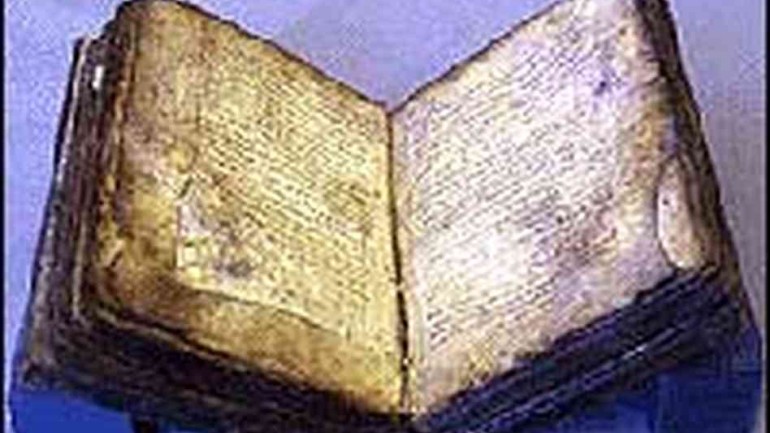This is the story of a book that could have changed the history of the World. To the untrained eye, it is nothing more than a small and unassuming Byzantine prayer book, yet it sold at Christies for over $2m. For faintly visible beneath the prayers on its pages are other, unique, writings – words that have been lost for nearly two thousand years.
The text is the only record of work by one of the world’s greatest minds – the ancient Greek, Archimedes – a mathematical genius centuries ahead of his time. Hidden for a millennium in a middle eastern library, it has been written over, broken up, painted on, cut up and re-glued. But in the nick of time scientists have saved the precious, fragile document, and for the first time it is revealing just how revolutionary Archimedes’ ideas were. If it had been available to scholars during the Renaissance, we might have reached the Moon over a hundred years ago.
The trail begins in the tenth century, when a scribe made a unique copy of the most important mathematics that Archimedes ever developed. For 200 years the document survived, but the mathematics in it was so complex that no one paid it any attention. So when one day a monk was looking for some new parchment – an expensive commodity at the time – to write a new prayer book, the answer seemed obvious. He used the Archimedes manuscript. He washed the Greek text off the pages, cut them in half, rebound them, and turned the Archimedes manuscript into an everyday prayer book. As he piously wrote out his prayers, he had no idea of the genius he was obliterating.
Several hundred years later, the Renaissance was under way. Scientists were beginning to grapple with new concepts, working out how mathematics could be used to explain the World around them. Little did they know that many of the problems they were just encountering Archimedes had already solved more than a thousand years before. So, tragically, they had to do that research all over again, setting back the development of science and technology immeasurably.
Then in 1906, in Constantinople, the document mysteriously turned up in a monastic library. An opportunistic scholar called Johan Ludwig Heiberg identified the text as Archimedes’ writings. Although the Greek text was very faint, Heiberg was able to decipher some of it. What he found astonished him, and made the front page of the New York Times. He revealed that Archimedes’ manuscript contained something called ‘The Method’, which showed not only Archimedes’ final proofs, but for the first time revealed the process of how he went about making his discoveries.





The thing i always take away from these kinds of documentaries, is that modern science is still surprised that ancient people were as intelligent as modern man. they always make statements saying hoe they are surprised and shocked by these discoveries. modern science is too sure of itself, too cocky. all you gotta do is look at ancient megalithic structures and you’ll see how much smarter they were than us. Egyptian pyramids – 3500 years old, no idea how they were built, Gobekli Tepe, 12000 years old, no idea how they built it,..and Tiahuanaco, which has been dated to 17000 years, no idea how they built it. and in fact, the older these structures get, the more advanced and flawless the cutting techniques get…modern history books tell us 17000 years ago, humans were hunter gatherers, who didn’t even have the wheel. modern science and history needs to humble themselves if they ever expect to solve the mysteries of history and mankind
I really enjoyed this doc. It’s really interesting how much information they can derive from a single book whose pages have been erased and are now rotting away. It makes you wonder how many books of similar value still exist or have been lost in time to mold, fire, war, etc.
Worth watching!
proud to be greek – hellinas